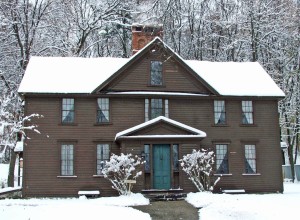 About a decade ago, I worked for a few years at the Orchard House Museum in Concord, Massachusetts. Best known as the home of Louisa May Alcott and the place where she wrote the classic novel, Little Women, the house has an impressive history of its own. When I was there the 300-year-old building, renovated by Bronson Alcott in the 1850’s, was in the midst of a massive preservation project, so I had the opportunity to see, up-close, some of the details of the colonial construction. Ever since, I’ve been fascinated not just by how historical houses are decorated, but how they’re constructed.
About a decade ago, I worked for a few years at the Orchard House Museum in Concord, Massachusetts. Best known as the home of Louisa May Alcott and the place where she wrote the classic novel, Little Women, the house has an impressive history of its own. When I was there the 300-year-old building, renovated by Bronson Alcott in the 1850’s, was in the midst of a massive preservation project, so I had the opportunity to see, up-close, some of the details of the colonial construction. Ever since, I’ve been fascinated not just by how historical houses are decorated, but how they’re constructed.
At that time, I was finishing work on my novel, Mr. Emerson’s Wife, about the Transcendental circle in19th century Concord. Little did I know that a few years later, I’d encounter the house again, as I researched a 17th-century Concord lawyer for my new novel, Flight of the Sparrow.
John Hoar, the man who built the home that the Alcotts purchased, was the colonial negotiator in the ransom of Mary Rowlandson. He was the man who escorted her back to the English towns after her release. Rowlandson writes about him in her narrative, and describes visiting his house on her return to Boston.
Despite his prominence in his own tumultuous time, Squire Hoar remains an obscure figure to us, hidden in the shadows of history. I had learned about some of his remarkable descendants when I was studying the Concord Transcendentalists, but there was little about the man himself – just the tantalizing suggestion he didn’t fit neatly into the Puritan mold.
When I began digging, I discovered a hero.
John Hoar was a principled and independent-minded man, who spoke his mind regardless of the consequences. He began having trouble with the authorities in the mid-1660s when he tried to expose the judicial corruption of Massachusetts Bay magistrates. He petitioned the governor for justice and received a hearing in October of 1665. It probably did not surprise him when his complaints were ruled “groundless and unjust,” since some of the judges he accused were sitting on the court. But even Hoar was surprised when they fined him and sentenced him to prison—to set an example for any who dared to challenge their authority.
Furious, Hoar stormed out of court. When he was arrested and hauled back in, his bond was set at 100 pounds (an extraordinarily high fee for that time), and he was disbarred.
The next spring, Hoar petitioned the court for relief and he was released and his fine was reduced, but his lawyer’s standing was not restored. Though he returned to Concord and his family, Hoar was not a man to remain silent. He told his neighbors exactly what he thought about the authorities. He was soon back in court, subjected to more fines, and the demand for a formal apology. When he was released with a warning, he went back to practicing law – and criticizing the authorities.
In 1675, when King Philip’s War broke out, Hoar offered to protect a group of friendly
Nipmucs who lived near Concord. He set aside some of his own property and, at his own expense, built a workshop and palisade for their defense, and helped them harvest their food.
Some of Hoar’s Concord neighbors, frightened by the close proximity of natives, even though they were friendly, secretly contacted the army captain, Samuel Mosely, a man known for his brutality.
On a Sunday morning in February, Mosely and his soldiers marched into the meeting house. After worship he addressed the congregation. He announced that he’d heard there were “some heathen in the town” that he believed were distressing people, and that if they wanted, he would remove them. Most people said nothing, though “two or three” encouraged him. So, over Hoar’s vigorous objections, he ordered his soldiers to break down the door and take the Indians. They followed his orders, destroying Hoar’s property, seizing the Indians and plundering their food and clothing. The Indians were then marched to Charlestown and sent to Deer Island.
But Hoar was not a man to be defeated. In late April, he volunteered to negotiate with the Indians over Rowlandson’s ransom. This was a remarkable act of courage, especially given the tenor of the times. Even though Hoar was known to the natives, there was no guarantee that he would succeed in his efforts to secure Rowlandson’s release. In fact, when he reached the Indian encampment at what is now Redemption Rock, shots were fired in his direction (over and under his horse), he was threatened with hanging, and was confined to a wetu for days before an agreement was reached.
But John Hoar had never let fear rule him, and he successfully negotiated Rowlandson’s release. He returned to Concord and continued to be a thorn in the side of the Puritan authorities.
The next time you’re in Concord, Massachusetts, I urge you to visit Orchard House. Not only to see the place where Louisa May Alcott lived and wrote, but also to honor the memory of a man of persistence and principle—a Puritan hero.


Reblogged this on Louisa May Alcott is My Passion and commented:
Here’s one of those fascinating stories about Orchard House to be featured in the upcoming documentary by someone who should know (pssst! 5 days to go on the Kickstarter campaign – help Orchard House meet its goal: https://www.kickstarter.com/projects/632439913/orchard-house
Amy’s book, Flight of the Sparrow is wonderful (see previous post); be sure and pick it up on Amazon.com.
Just reblogged your post onto my Louisa blog – Mr. Hoar was indeed a hero and a visionary. Orchard House seemed to attract those types. 🙂
It does indeed! Thanks for reblogging the post, Susan!
Reblogged this on Just As I Am…Meet Laura Ingalls Wilder and commented:
Just discovered this blog, courtesy of a share by my friend and Alcott scholar, Kristi Martin, who brought Amy Belding Brown to my attention with this link. Kristi and I both work in Concord and greatly admire what is known as Orchard House, the home built by the subject of this piece, John Hoar, and which would later be home to Louisa May Alcott as she penned Little Women.
I love antique houses, women’s history, and stories of rebellious colonists of New England in the days before notions of antidisestablishmentarianism took hold. This one combines them all!
Reblogged on Just As I Am…Meet Laura Ingalls Wilder. What a great convergence of topics…rebellious citizens like Hoar who paid the consequences of defying the overreach of colonial authority, Alcotts, Concord, Nipmucs, and Rowlandson’s redemption by said Rebellious Citizen.
What a great blog! I don’t often read fiction these days but now I want to read yours…
Thanks for reblogging, Melanie. It was an amazing time – and an amazing place.
Im always loooking for good convergences of historic intrigue. Thanks for writing and sharing this one.
Interesting notes. Thank you. Is there any documentary evidence that shows that the house was John Hoar’s (and his wife Alice Lisle’s)? I am descended from John Hoar. As an aside, so is George Bush…… :-).
Thanks in advance,
Scott Jack
London, ON
I believe there’s documentation of the deed and placement of the buildings on John Hoar’s land. The house was in deteriorating condition in the 1850’s when Bronson Alcott bought and remodeled it into Orchard House. I recommend contacting the Orchard House Museum and the Concord Free Public Library ( both in Concord, MA) for more information. The Concord Town Clerk’s office might also be able to help.